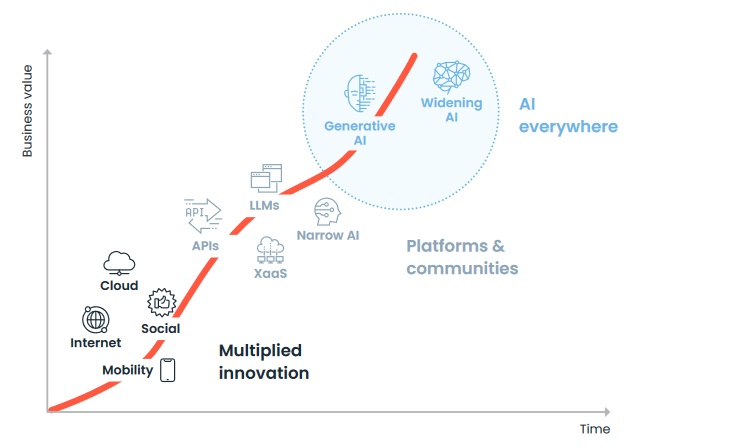Generative AI represents more than just a technological advancement; it's a transformative shift in how businesses operate. Companies are beginning to tap into its ability to enhance processes, innovate products and improve customer experiences. According to Next Steps in the Era of Digital Business, a new IDC InfoBrief sponsored by Endava, 60% of CEOs globally highlight deploying AI, including generative AI, as their top modernization priority to support digital business ambitions over the next two years. And businesses are shifting from merely experimenting with technology to implementing it strategically.
But IDC found that only 17% of companies have successfully transitioned from testing generative AI to deploying it in live environments. The InfoBrief points to talent shortages and outdated infrastructure as significant challenges for organizations looking to scale their digital capabilities.
And the stakes are high. As a key enabler for innovation, companies that delay AI adoption risk slower time-to-market and reduced operational efficiency. With 38% of organizations making significant investments in generative AI, the race to harness its potential is only intensifying.

Infrastructure and Strategy: Laying the Foundation for Success
Thriving in an AI-driven world requires more than simply adopting new technology — it demands robust infrastructure and thoughtful planning. The InfoBrief shows that organizations that achieve this level of implementation often attribute their success to high-quality data access and strong partnerships with vendors specializing in AI. On the other hand, nearly one in three organizations cite inadequate infrastructure performance as a barrier to achieving AI project success.
Modernizing legacy systems is critical for businesses looking to thrive in an AI-driven world. Outdated infrastructure often leads to overspending and limits the ability to scale new initiatives. By addressing technical debt, companies can free up resources to focus on strategic priorities, like leveraging AI to enhance operations or create personalized customer experiences.
Upgrading core systems ensures that infrastructure can handle the demands of generative AI, which 84% of organizations recognize as a major new workload. Without modernization, companies risk performance issues that can derail AI projects. A balanced approach is key — ensuring that new capabilities integrate seamlessly with existing operations.
Success in modernization often comes from partnering with external IT service providers who bring the expertise needed to manage complex transitions. These collaborations can streamline the process, reduce costs, and deliver reliable results, positioning businesses to innovate and compete more effectively.
The Human Factor: Bridging the Skills Gap
While AI technology itself is powerful, its success depends on the people behind it. A third of CEOs noted that attracting and retaining skilled talent is crucial to achieving their business goals. Unfortunately, many organizations lack the in-house expertise needed to fully leverage AI.
The report suggests that partnerships with external IT service providers can help bridge this gap. These providers bring the expertise required to implement AI projects effectively. In fact, 47% of companies that successfully deployed generative AI credit their partnerships with strategic vendors for their achievements. As ecosystems grow more complex, the ability to collaborate with skilled and flexible partners will be a defining factor for success.
Moving Forward with Confidence
As we enter the era of "AI everywhere," organizations must take proactive steps to adapt. Embracing change, modernizing infrastructure and ensuring access to high-quality data are pivotal steps to thrive in this evolving landscape. Equally, building strong partnerships and maintaining a clear focus on long-term goals will empower businesses to navigate this transformation with confidence.
Digital transformation is far from a one-time effort, and in fact, 48% of companies globally now consider themselves digital businesses. Those that seize AI's potential while addressing fundamental challenges will position themselves for sustainable growth in a technology-driven future. Agility and a steadfast commitment to innovation will distinguish leaders in this new phase of the digital era.
Success in this AI-driven world requires organizations to embrace the opportunities that come with change. Modernizing infrastructure to meet dynamic business needs and securing high-quality data to fuel AI-powered projects are essential. By partnering with skilled experts who bring fresh insights and proven expertise, businesses can gain a decisive edge — confidently overcoming challenges and staying ahead in an increasingly competitive landscape.



